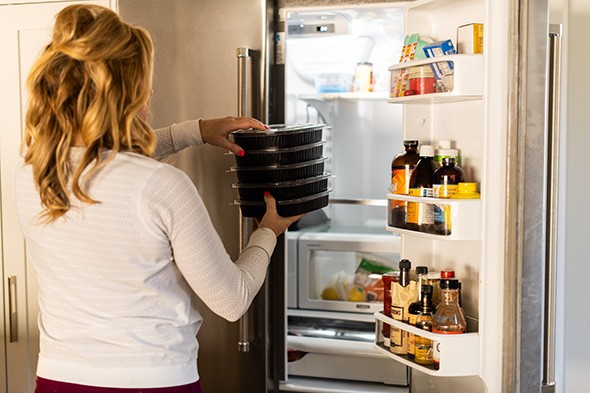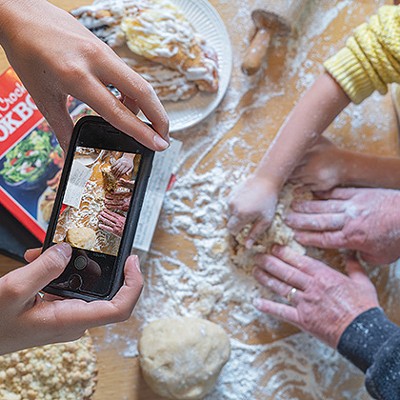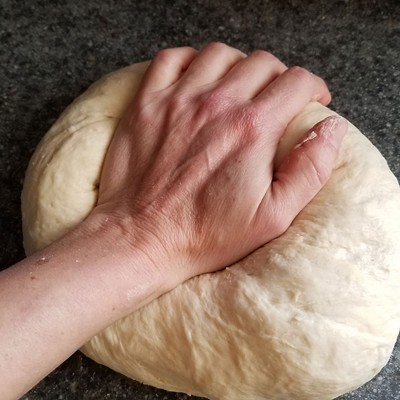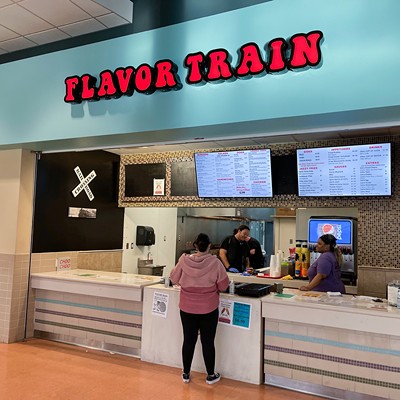
What started as a mission to improve the food quality offered at the hospital has turned i2U Culinary Solutions into a one-stop shop for transforming healthy outcomes through lifestyle choices.
Located at 7908 N. Western Ave., i2U’s facility is home to daily training regimens and a full-service kitchen turning out dietitian-certified meals tailored through data compiled from clients’ lab work that is done on-site.
The company started as a partnership between certified nutritionist and personal trainer Brent Wilson and chef Jonathon Stranger (En Croûte, Osteria, St. Mark’s Chop Room, Bar Cicchetti and Prairie Wolf Spirits) with a focus on serving healthy food to partner hospitals Lakeside Women’s Hospital, Community Hospital and Northwest Surgical Hospital. In October, i2U began delivering weekly, ready-to-eat meals to all clients in Oklahoma City, not just those in the hospital.
Stranger remembers having to go through a three-day hospital stay after surgery a few years ago and being shocked not just at the quality of food served by the hospital but its reliance on processed foods.
“I was in the hospital for three days and wasn’t allowed to move,” Stranger remembered. “What they gave to eat in the hospital and what they told me to eat afterward was the same: soft foods that have a ton of sugar with hydrochlorides with gelatin that are also not good for you.”
Stranger began working with one of his business partners, Dr. Steven Sands, who is involved in health care, and they were put in touch with Wilson, who was working as a dietitian for an Oklahoma health-care system.
“I worked in a health-care setting and saw that it wasn’t fixing chronic disease through the system of medication as resolution,” Wilson said. “It’s sad because when people are at their sickest, just diagnosed with diabetes or had a heart attack, and we provide them with what caused the problem, we give them highly processed food loaded with salt and sugar and refined oils and expect them to get better. People actually try to mimic what they’re getting at the hospital at home. I’ve had people that come to see me and say, ‘This is what I was served at the hospital, so this is what I must eat outside of it.’ So they’re eating cereal at breakfast, thinking it will help blood sugar.”
“It’s lifestyle intervention to
tweet this
fix chronic disease.”
—Brent Wilson
Wilson’s journey to become interested in nutrition and a certified diabetes educator began with the same kind of doctor’s visit that brings in many of his clients. At the age of 18, Wilson weighed more than 300 pounds and was diagnosed as pre-diabetic and prescribed statins to lower blood pressure.
“That’s what puts the fire in my belly to help these folks,” Wilson said. “I was 18 and got told I had all of these problems and pushed pills. How do you do this without medicine? I figured there are bunch of people who need this type of guidance and they’re not getting it right now. I want [i2U Culinary Solutions] to be a place where they can get everything taken care of. It’s lifestyle intervention to fix chronic disease.”
Wilson equates the idea of using medicine to lower chronic disease like high blood pressure, high cholesterol and diabetes to that of a doctor prescribing pain medication because there is a rock stuck in your shoe. The medicine helps with the pain but does nothing to solve the root cause.
He said there are multiple clients who have been able to get under diabetes thresholds without taking any medicine.
“So many people think it’s going to take years, but we can see blood sugar down in a week. … It’s getting them to believe they can do it and to have the confidence,” Wilson said. “I’ve seen it done too many times to say it’s impossible.”
Healthy lifestyle

“So many walk into a grocery store and pick up the same things out of habit,” Wilson said. “What aisles should we hang out in? On the outside of the store and areas where there aren’t boxed processed foods. In an ideal world, we’d all eat fresh produce and animal products, but we do at times have to go to the boxed aisle and teach them how to count carbs and what to look for.”
Wilson also offers private and small group training sessions with equipment right there in the i2U facility. The kitchen at i2U led by chef Ryan Berry turns out daily meals that are sent to clients at partner hospitals as well as wellness meals that are available for breakfast ($8 per meal) lunch ($10) and dinner ($15) that are delivered to clients in Oklahoma City on Mondays and Fridays.
The wellness menus change monthly and include options like potato-crusted quiche for breakfast, shrimp spring rolls and Brussels sprout salad for lunch and Wagyu meatloaf with potato puree and asparagus for dinner. Clients can also choose “dietitian’s choice” and Wilson will select items for the client based on their allergy needs and dietary goals revealed from their blood work.
“Brent’s done an exceptional job meeting with people and finding what is unique about them,” Stranger said. “Brent is the biggest difference with a meal delivery service. You’re guided by someone very educated with your body, using actual science. Every car is handled differently by a mechanic. [Our body] is incredibly more complex, the most complex in the world, and for some to say, ‘Atkins or keto for everyone,’ doesn’t make any sense.”
Wilson favors a diet high in protein and saturated fat and low in simple carbohydrates and sugar. He said too many people, including active dietitians, are still operating under the idea that “all food is good if eaten in moderation,” and relying on outdated studies pointing at saturated fat as a culprit for heart disease. The movement began in the 1950s with studies led by Ancel Keys, including a flawed seven-country study that credited the “Mediterranean diet” as the healthiest option. American Heart Association later adopted studies sponsored by the sugar industry and soft drink companies that pushed low-fat, high sugar foods as healthy.
“That moment in time was the worst piece of nutritional advice that’s ever gone out. Now we have dietitians still teaching this today even though research has pretty much disproven the fear of cholesterol and saturated diet,” Wilson said. “We went on a low-fat craze. People were told to stop using butter and use margarine. Industrial seed oil [vegetable, sunflower and canola] causes so much inflammation in the body. That’s what causes heart disease. It isn’t caused by cholesterol and saturated fats; it’s caused by sugar and refined vegetable oils, the things we try to push to fix the issue.”
Visit i2uculinary.com.












